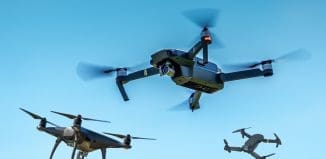UAV development oversight and control
This post is also available in:  עברית (Hebrew)
עברית (Hebrew)

Israel’s defense industries are opposed to the proposition of a central body entrusted with determining Israel’s policy concerning unmanned systems, such as unmanned aerial systems (UAS). According to defense industry sources, “you cannot establish a body to determine UAS development policy, and what’s more, you do not need such a body.”
An idea in this direction recently floated in a publication by INSS, the Institute for National Security Studies.
The recent publication notes that Israel possess a great deal of knowledge in the field of deploying unmanned systems to security missions. Thus, the publication recommends the establishment of body, under the auspices of Israel’s Ministry of Defense (MoD), which would formulate policy and strive to integrate unmanned systems as much as possible in all security fields, with an emphasis on intelligence gathering.
The paper, entitled “Application of unmanned military systems by 2033” is based on technological projection. Co-authored by Yoav Zachs and Liran Anteby, it was recently published by the INSS.
In an interview to i-HLS, Antebi, a senior fellow at INSS and a post-graduate at Tel Aviv University currently working on her PhD dissertation, explained that the paper recommends establishing a special body to be in charge of the entire field of unmanned systems, as well as setting national policy. The target is to prevent the whole sector being completely based on the army, and promote using unmanned systems for myriad civil purposes, from medicine to households, agriculture and industry. Additional missions for this body, when established: setting regulation for using unmanned systems for civilian purposes, a field which is barely existent in Israel for now. The body will formulate policy on ethical and legal issues concerning the use of unmanned systems.
Anteby underscores another recommendation of the paper, namely “to strive for the decrease of terrorists’ access to unmanned systems” and explains. “The surrounding terrorist organizations are far from sedentary. ISIS has deployed unmanned aerial vehicles (UAVs) whose price tag is barely $1400. They have, for instance, a drone called ’Phantom’, which produces footage and provides them with an aerial image of army camps in Syria. This is a primitive, simple system. You can procure its elements in stores or in the internet. Nevertheless, it is effective, and it takes two F-16s at a cost of dozens of millions of dollars. The Hezbollah and / or Hamas already has, or will have, such simple drones. They might be produced by various countries in Africa or South America.
Register to iHLS Israel Homeland Security
The i-HLS source in the defense industries also referred to this recommendation. He called it ’an academic recommendation”. The reason being, “there is no way you can control the global UAV market nowadays.” After all, you can practically order such systems on the internet. When countries like China offer UASs to anyone, this recommendation is simply impractical,” he explained.
Anteby is highly versed in the study of future use of UAV swarms or groupings. “The real leap forward in terms of the development of unmanned systems is at the level of autonomy they will feature. Namely, their ability to operate without any human involvement. Their autonomy will usher in a change in the relations between man/machine: in 2010, you had one robot per 40 soldiers. In 2033, we might see the opposite. Combat theaters may have 40 robots with barely one operator running them all, as a group tasked with completing one mission. We project that a swarm will receive its mission, and this group will decide how to carry it out using artificial intelligence. We find it likely they will perform their mission at levels of accuracy and speed that supersede those humans can display. Such a swarm of unmanned systems will operate like a military unit. It could be part of ground, air or naval operations, including attacking targets.”
The primary recommendation, namely the establishment of a central body, is vehemently opposed by Israeli defense industries, whose officials claim there is already high involvement on the part of MoD in UAV development for military uses. “Any additional oversight and control body will only add more confusion and bureaucracy,” said a defense industry source.
According to this source, the competition between the companies in the field of UASs and unmanned systems is a very good thing. “Each company has its own ideas and its own propriety technologies. This serves as a hotbed for creativity, providing proven results, even if, occasionally, different companies come up with similar things,” he added.
The i-HLS source further said the only UAS-related body that should be established is one that would be entrusted with safety issues, concerning the safe operation of UAVs of all kinds, within Israel’s civilian airspace.
Israel’s Civil Aviation Authority is currently in charge of this, but the source noted this field must be stepped up. “After all, Israel is a UAV country,” he said.





























